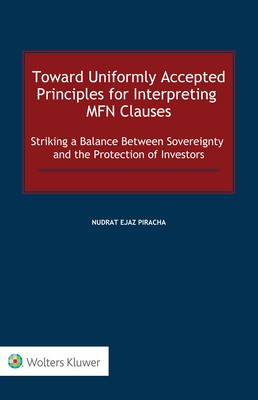
- Išsiųsime per 10–14 d.d.
- Autorius: Nudrat Ejaz Piracha
- Leidėjas: Kluwer Law International
- ISBN-10: 9403532734
- ISBN-13: 9789403532738
- Formatas: 15.6 x 23.4 x 3.7 cm, kieti viršeliai
- Kalba: Anglų
- Extra -15 % nuolaida šiai knygai su kodu: ENG15
Toward Uniformly Accepted Principles for Interpreting MFN Clauses + nemokamas atvežimas! | knygos.lt
Atsiliepimai
Aprašymas
How fair is the most-favored-nation (MFN) principle as applied in the real world? Although international jurisprudence and tribunals typically tend to safeguard the sovereignty of the host State at the expense of foreign investor protection, the author of this meticulously researched study demonstrates that in fact such an approach is not warranted under international law rules on the interpretation of treaties. Based on the history of most-favored-nation clauses (MFNCs) and applicable treaty and customary international law, this book advances a set of principles that should guide international courts and tribunals when interpreting MFNCs.
In a comprehensive study of all publicly available international cases relating to MFNCs, the study highlights the various legal interpretive theories that have arisen. In the process, the author achieves such groundbreaking insights as the following:
- shatters commonly held misconceptions about the investor-State regime and the misguided belief that States are at a disadvantage in the investor-State dispute settlement system;
- challenges the conception that interpretation and application of MFNCs by investment tribunals give rise to a claim of infringement of State sovereignty; and
- puts to test the widely held conception that international tribunals' interpretation of MFNCs has led to an incoherent, inconsistent, and unpredictable international arbitration regime.
The substantive analysis in the book focuses on the debate about misapplication of the Vienna Convention on the Law of Treaties and other interpretive theories by tribunals and examines jurisdictional and substantive issues involving MFNCs.
With its emphasis on the functional benefits of greater uniformity in investor-State jurisprudence, and its research-based promotion of consistency and coherence, this book provides a definitive overview of the complex ambiguities surrounding MFNCs. It will be welcomed by investors, State policymakers, relevant international organizations, arbitrators and other practitioners, academics, and all parties advocating reform in the investor-State dispute settlement regime.
EXTRA 15 % nuolaida
Kupono kodas: ENG15
Akcija baigiasi už 5d.15:56:49
Nuolaidos kodas galioja perkant nuo 10 €. Nuolaidos nesumuojamos.

- Autorius: Nudrat Ejaz Piracha
- Leidėjas: Kluwer Law International
- ISBN-10: 9403532734
- ISBN-13: 9789403532738
- Formatas: 15.6 x 23.4 x 3.7 cm, kieti viršeliai
- Kalba: Anglų
How fair is the most-favored-nation (MFN) principle as applied in the real world? Although international jurisprudence and tribunals typically tend to safeguard the sovereignty of the host State at the expense of foreign investor protection, the author of this meticulously researched study demonstrates that in fact such an approach is not warranted under international law rules on the interpretation of treaties. Based on the history of most-favored-nation clauses (MFNCs) and applicable treaty and customary international law, this book advances a set of principles that should guide international courts and tribunals when interpreting MFNCs.
In a comprehensive study of all publicly available international cases relating to MFNCs, the study highlights the various legal interpretive theories that have arisen. In the process, the author achieves such groundbreaking insights as the following:
- shatters commonly held misconceptions about the investor-State regime and the misguided belief that States are at a disadvantage in the investor-State dispute settlement system;
- challenges the conception that interpretation and application of MFNCs by investment tribunals give rise to a claim of infringement of State sovereignty; and
- puts to test the widely held conception that international tribunals' interpretation of MFNCs has led to an incoherent, inconsistent, and unpredictable international arbitration regime.
The substantive analysis in the book focuses on the debate about misapplication of the Vienna Convention on the Law of Treaties and other interpretive theories by tribunals and examines jurisdictional and substantive issues involving MFNCs.
With its emphasis on the functional benefits of greater uniformity in investor-State jurisprudence, and its research-based promotion of consistency and coherence, this book provides a definitive overview of the complex ambiguities surrounding MFNCs. It will be welcomed by investors, State policymakers, relevant international organizations, arbitrators and other practitioners, academics, and all parties advocating reform in the investor-State dispute settlement regime.




Atsiliepimai